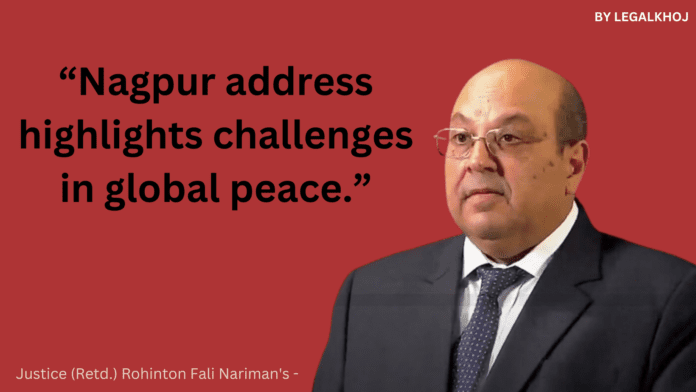Justice Nariman’s recent address in Nagpur has brought to light an essential and challenging aspect of achieving global peace: the prosecution of all those responsible for war crimes, regardless of their status as victors or the vanquished.
He shed light on the shortcomings of the Nuremberg and Tokyo trials, which followed World War II, and emphasized the necessity of arraigning war criminals without bias, suggesting that this could pave the way for the universal world peace that humanity has long sought.
In his lecture titled “The Nuremberg and Tokyo Trials – The Rule of Law Vindicated, Justice (Retd.) Rohinton Fali Nariman’s called for a paradigm shift in the approach to addressing war crimes. He advocated for the establishment of clear international standards to define war crimes, thus avoiding the criticism that war criminals were convicted ex-post facto. Such an approach would provide a framework to address past atrocities while setting guidelines for future accountability.
Justice Nariman’s plea for a charter outlining war crimes aligns with the evolving standards of international law and human rights. The absence of such a charter can lead to ambiguity and disputes regarding the legal basis for prosecuting individuals for war crimes. By establishing a clear and universally accepted definition of war crimes, the international community can work towards a more just and transparent system of accountability.
The core of Justice Nariman’s message centers on the impartiality and transparency of the process of prosecuting war crimes. He emphasizes the need for judges from neutral countries to preside over war crimes trials. This would ensure that the trial process remains free from the influence of the warring parties and is conducted with the highest degree of objectivity and fairness.
One of the critical issues raised by Justice Nariman is the asymmetry in accountability for war crimes. He noted that the trials following World War II focused on prosecuting individuals from the defeated nations, leaving those from the victorious nations largely untouched. This disparity has raised questions about the credibility of these trials and whether the rule of law was genuinely vindicated.
The distinction between the Nuremberg and Tokyo trials is another aspect highlighted by Justice Nariman. While the Nuremberg Trials had a predominantly Western composition, the Tokyo Trials included broader international representation. This distinction reflects the challenges faced in achieving a truly impartial and globally representative system for prosecuting war crimes.
In recounting the dissenting opinions that emerged during the Tokyo Trials, Justice Nariman brought attention to the significant contribution of Justice Radha Binod Pal. Justice Pal’s 1200-page dissenting judgment challenged the prevailing narrative and questioned the fairness of the trials. He argued that Japan may have been compelled to wage a defensive war against colonial powers, particularly those from the West.
Justice Pal’s dissenting judgment raised a crucial issue regarding the accountability of the victors themselves. Justice Nariman noted that Justice Pal questioned the actions of the victors, particularly the dropping of atomic bombs on Hiroshima and Nagasaki, which resulted in the deaths of a significant number of civilians. This presented a moral and legal dilemma: if the victors were the ones administering justice, were their actions subject to the rule of law?
Justice Nariman raised three notable points from the Tokyo Trials. First, he observed that the Italians were not arraigned, suggesting inconsistencies in the application of justice. Second, he pointed out that the Head of Japan was not arraigned, and he speculated that this might have been for pragmatic reasons. However, he challenged this inconsistency, emphasizing that pragmatic reasons could not absolve individuals like Adolf Hitler if a new German state were to be formed. Finally, Justice Nariman noted that war crimes committed by the victors were not scrutinized, highlighting the lack of accountability for actions by those on the winning side of the conflict.
Justice Nariman’s lecture underscores the pressing need for clear and universally accepted international standards for defining war crimes. It also emphasizes the critical role of impartial judges from neutral countries in ensuring that the administration of justice in war crimes trials remains fair and transparent. Moreover, Justice Nariman’s call for the impartial arraignment of all individuals responsible for war crimes, irrespective of their status as victor or vanquished, represents a significant step toward achieving universal world peace. This pursuit of peace hinges on the principles of justice, accountability, and a commitment to upholding the rule of law in the face of grave violations of human rights.
NCLT initiates insolvency process due to payment default and bounced post-dated cheques.




